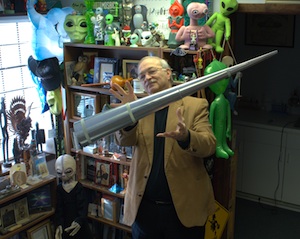The JREF is proud to have begun a fellowship and learning program with the Center for Inquiry, the first of which is recounted below by Christina Stephens, the first participant in the program. Additional arrangements with other organizations are being explored, as well. Check back at randi.org in the months ahead for more opportunities for similar week-long study in paranormal investigation and skeptical inquiry.

A few weeks ago, I had the opportunity to spend a week getting to know all of the amazing and talented people at the Center for Inquiry in Buffalo, New York. I spent most of my time with Joe Nickell, working on various skeptical investigation projects and picking his brain for information on the ethics and process of skeptical investigations. I would like to thank Joe Nickell, the James Randi Educational Foundation and the Center For Inquiry for an enlightening and educational experience.
I consider myself an academic researcher. When I do research, it takes this form: Ask a question. Do an extensive literature review. Ask more questions. Make a hypothesis. Write an experimental protocol. Conduct an experiment with many subjects. Report on the results. This type of research is somewhat different from that of Joe Nickell, who, in common with James Randi, is a full time professional paranormal investigator. Rather than attempting to find a mystery, Joe’s detective work is geared toward solving mysteries.
Joe solves individual case-studies, and I solve cases with many subjects and controlled variables. Both of us do work that is essential and fundamental to better understand reality. As the Chair of the Fringe Science Investigation Committee of the Skeptical Society of St. Louis, the sort of academic research that I do professionally is simply too narrow in scope for the kind of investigations that I think our committee is capable of. Hence, education beyond research academics is essential.
Joe and I covered many topics. We conversed at length about how to properly conduct investigations. Joe basically invented paranormal detective work as an outcropping of his work as an undercover investigator. He advocates investigating on site rather than from your skeptical armchair, checking details of an account so that you’re not trying to explain something that never happened, and assessing a claim with a controlled test or experiment among other techniques.Each of these techniques was developed to uncover what’s really going on.
One of the more important aspects of skeptical investigations is to avoid being a “debunker.” Most skeptics can wax at length about how one must not be a debunker – a dismissive, arrogant sort of intellectual who assumes that a given paranormal or pseudoscience phenomena does not work or is not true, and then sets out to collect reams of evidence to back up her disbelief. Doing so is what one might call being an a-priori skeptic. An a-priori skeptic is one who dismisses claims as fervently as a true believer might hold on to them. We should celebrate “I doubt” while questioning, “I know.”
One of the more helpful things I learned from Joe is this: the best thing that we can do to get people to understand our position as skeptics is not to be hard-nosed and dismissive, but to be empathetic. People aren’t born skeptical, with the tools to understand the scientific method and to apply critical thinking to all situations. They have to be given or give themselves those tools. Some people do not become skeptics until late in their lives. As such, we were all there once. Most of us can remember believing in some form of pseudoscience and we do ourselves a disservice by acting as though we’ve always had the answers. Then, rather than our skepticism turning into an “us vs. them” situation when confronted with pseudoscience, we can explain the process by which we moved from believers to skeptics. Through the course of thinking critically and applying the tools of science, we changed our minds. It is this gentle empathy that has the power to persuade more so than mockery and arrogance. This is especially true with regard to victims of pseudoscience. When someone has been taken in by the claims of the anti-vaccination movement, been fleeced of their money by a charlatan psychic, or fervently believes that quantum physics hold the key to explaining ESP powers, they are a victim. By portraying these victims as ignorant credulous masses we are further victimizing them.
I’m one of these people who celebrates being wrong. What I mean by that is that if someone can show me that my thinking has gone astray, that I have the wrong information, or that I was mistaken – I will happily shake the hand of the person who set me straight. I love being wrong because it gives me humility and the capacity to change. This is understandably abnormal. In a world where most people abhor being wrong, it is better – for the sake of changing minds - to share a story about when we were wrong, rather than trying to show everyone how right we are.
I also must let readers in on a little secret: tucked away in and around Joe’s office at CFI is the most impressive collection of paranormal and pseudoscience artifacts I have ever seen. During his travels, Joe has collected everything from green bobbly alien heads to spirit paintings to antique homeopathy sets. Part of this collection is viewable online at http://www.skeptiseum.org.
My week at CFI filled my brain to capacity with information. I look forward to putting said information to good use.